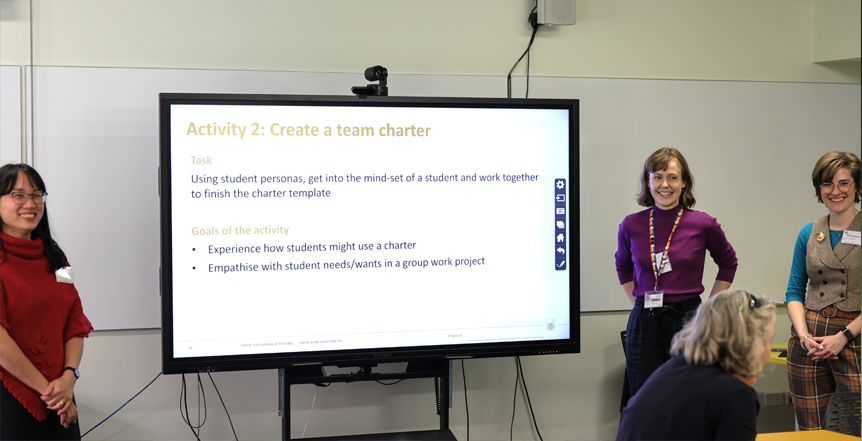In the ever-evolving landscape of education, the emphasis on collaborative learning experiences continues to gain momentum. Employers from various sectors consistently place high value on interpersonal skills and the ability to collaborate effectively within a team (Baird & Parayitam, 2019; Oliver & Jorre, 2018; Riebe et al., 2016). Thus, group work becomes a vital arena where students cultivate these essential skills, establishing a strong groundwork for their future careers. Additionally, assessments based on group work simulate real-world situations, reflecting the dynamics of collaborative projects encountered in professional settings. Research reports that these immersive learning experiences not only improve academic achievement and promote deeper knowledge retention (Swanson et al., 2019) but also boost students’ sense of belonging (Meehan & Howells, 2019; Pei et al., 2023).
At the Australian National University (ANU), collaborative learning is not just a mere aspiration but an essential component of ANU’s educational ethos. The ANU Learning and Teaching Strategy emphasises the importance of offering collaborative and team-based learning opportunities to students (Goal 3.31) as well as fostering their abilities in collaboration and teamwork (Goal 3.33). Utilising group work and group assessment is seen as an effective strategy to achieve these objectives, while also aligning with broader goals of providing authentic assessments rooted in real-world contexts (Goal 4.12 and Goal 7.23). Moreover, group-based learning is expected to be integral in shaping learning experiences aimed at nurturing the ANU Graduate Attributes. All aim to ensure that ANU graduates are well-prepared to navigate the complexities of their future careers.








While the benefits of group work are abundant, its implementation may pose certain challenges. In response to these concerns, two workshops on group assessment were offered at the ANU Centre for Learning and Teaching on 17th April and 22nd April. These sessions brought together ANU staff with diverse teaching experiences from across all ANU colleges. The workshops were designed to encourage open discussion and experience sharing, following the journey of an educator navigating through a group assessment process. The workshops featured bursts of information and practical tips, followed by hands-on activities for educators to put ideas and concepts into practice collaboratively. Laughter also filled the room during the group activities using the student personas, which added a sense of enjoyment and comfort to the workshop. Notably, the presence of esteemed ANU educators, including Distinguished Professor and former ANU Vice-Chancellor Brian Schmidt, highlighted the significance of group assessment and collaborative learning.
Group work represents more than just a pedagogical tool; it exemplifies ANU’s dedication to fostering well-rounded student development and preparing future leaders to confront the challenges of tomorrow. If you are interested in tailored workshops on group assessment for your schools or would like to join upcoming group work workshops, please send your inquiries to clt@anu.edu.au.
May 2024
Dr Nguyen Bui, Marianne Mettes, and Angela Stoddard, from the Education Design team, the ANU Centre for Learning and Teaching
References
Baird, A. M., & Parayitam, S. (2019). Employers’ ratings of importance of skills and competencies college graduates need to get hired: Evidence from the New England region of USA. Education & Training, 61(5), 622–634. https://doi.org/10.1108/ET-12-2018-0250
Meehan, C., & Howells, K. (2019). In search of the feeling of ‘belonging’ in higher education: Undergraduate students transition into higher education. Journal of Further and Higher Education, 43(10), 1376–1390. https://doi.org/10.1080/0309877X.2018.1490702
Oliver, B., & Jorre de St Jorre, T. (2018). Graduate attributes for 2020 and beyond: Recommendations for Australian higher education providers. Higher Education Research & Development, 37(4), 821–836. https://doi.org/10.1080/07294360.2018.1446415
Pei, L., Poortman, C., Schildkamp, K., & Benes, N. (2023). Teachers’ and students’ perceptions of a sense of community in blended education. Education and Information Technologies, 29, 2117-2155. https://doi.org/10.1007/s10639-023-11853-y
Riebe, L., Girardi, A., & Whitsed, C. (2016). A systematic literature review of teamwork pedagogy in higher education. Small Group Research, 47(6), 619–664. https://doi.org/10.1177/1046496416665221
Swanson, E., McCulley, L. V., Osman, D. J., Scammacca Lewis, N., & Solis, M. (2019). The effect of team-based learning on content knowledge: A meta-analysis. Active Learning in Higher Education, 20(1), 39–50. https://doi.org/10.1177/1469787417731201

